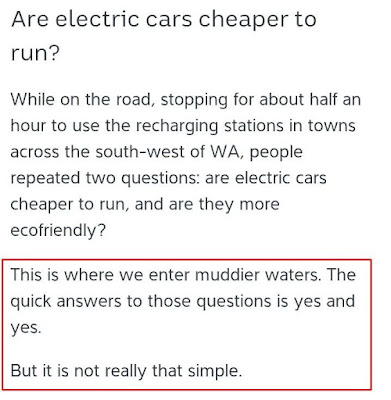Recently I see that the ABC has become a mouthpiece for the push in this direction as if they've already decided. Sadly rather than present unbiased information they unashamedly promote stuff that doesn't even add up ... for instance:
http://www.abc.net.au/news/2017-08-21/can-electric-cars-go-the-distance-on-aussie-roads/8827926
This unashamed piece can't even present the facts reasonably and chooses to cherry pick its data. It starts by asking the obvious question of: Are electric cars cheaper to run
and comes up with the quick answer of yes and yes, but as they indicate its not really that simple because it quickly emerges that its No and NO.
For instance they present this "analysis"
I would take issue that the "average" fuel economy is 11.1L/100Km ... shit my 1989 3L V6 Pajero 4WD station wagon gets that. My friends Subaru gets more like 8 and a Hyundai i30 more like 6 ... so you can half that figure for the cost to travel 100km for a petrol vehicle straight away.
However its even more disingenuous because they themselves are talking about longer distances, and in their own article say: "However, the RAC-installed recharging stations on WA's Electric Highway cost the user 45 cents for each kilowatt-hour of electricity, plus a $1 transaction charge."
So if we substitute the more correct 45cents for a highway journey it becomes more like $8.10 plus the $1 transaction charge making $9.10
So for the Electric car its $9.10 and for a modern car using 8L/100Km its $10.40 ... suddenly less attractive isn't it. It only gets worse when you factor in modern diesel engines in the 2L category are regularly delivering 4.5L/100km.
This does not mention how long it takes to "fuel up" while we know that to fill up and get going on the highway is usually a matter of minutes, for the electric its going to be longer.
Watt does it all mean?
People will fuzz out on this, but a kilowatt is a thousand watts, so assuming you have the need to put 18,000 Watts for an hour (that's what watt hours means) into your car and you can use the three phase 410 volt supply you will be needing to suck 45amps (Watts = Volts x Amps and so 410 * 45 = 18450 )... for an hour ... Inconvenient this truth stuff isn't it.Of course you can drop that to half an hour if you punch in 90 amps.
That would pretty much max out the capacity of the service station to supply (and keep its own lights on).
Imagine if there was 2 or even (shock) 4 cars attempting to fill up ... of course you've never seen so many cars in the servo have you ...
The truth - inconvenient isn't it ...
The article tries to suggest that you can make it even cheaper if:
The cheapest option for electric car owners is recharging at home using the electricity from solar panels and stored by a home battery.
So, you'll need to have a good 4Kw system on your roof running all day to charge your car to drive 100Km ... meaning you will negate that solar electric advantage of the house ... ohh, and you'll need at least 18Kw of battery too ...
Truth in Costs
Most car organisations will say that the true cost of ownership of a vehicle must I clude repayments and depreciation, meaning what you paid for it minus what you sold it for. The cost of fuel is often insignificant.So if you buy an electric car you'll also suffer greater depreciation because they cost more in the first place too .. expect 30% drop in the first year. The Nissan Leaf (a mid range car equivalent in spec to an i30) will set you back $51,000 while the Hyundai will set you back $20,950
So 30% loss on $51,000 is $15,000 ... most of the entire price of the Hyundai.
fuck
The article goes on to mention in one sentence:
Unless you are recharging using a renewable energy source, the power electric car owners are using still comes from burning traditional fossil fuels which, in WA at least, is primarily coal.Yes, that's right ... it still means CO2
So like the article says near the end:
Electric future of the automotive industry
Owners of electric cars say their cars are not the future, they are the past, because electric cars have been around since the mid-19th century.Nothing has changed since then either, for in the past Electric cars have been the realm of the wealthy.
As is typical of propaganda, simply tell enough stuff that looks to be true (even though it won't pass scrutiny) and avoid all those inconvenient facts that get in the way of pushing your agenda.
Ask youself this: who actually benefits from electric cars? Would it be the electric car makers, or are they really "just doing it for society".
Here's some evidence:
So despite selling a fraction of the cars, Tesla is worth as much as GM in terms of Market Capitalisation while running a loss not a profit.
Hmmm
Lastly I'll add that the real reason to promote electric vehicles has nothing to do with anything mentioned in the usual public sell-job, its more about moving pollution from one place (cities) to another place (perhaps to someone elses back yard).
I encourage you to think critically and act with conservation in mind. My method is to walk more, use public transport in cities, ride my motorcycle and use my car last.
Think about it with the facts clear in mind












1 comment:
hmmm, I am always a bit weary when something becomes "flavor of the month" news and they start to push it.
I never knew the real facts about the whole electric car story they way your presented it but the single question that worried me was: where is all that electricity going to come from? unicorn pixy dust?
If the whole thing is mainly hinged on the environmental angle benefit, as the propaganda is trying to sell, the current production of electricity certainly is not stacking up in its favor.
Then remains the very troublesome management of production and recycle/disposal of batteries.
But if I listen to hipsters the whole thing appears to be just so easy-peasy :-)
Post a Comment